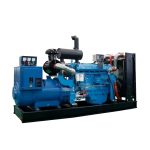Introduction:
In today's world, access to reliable and high-quality power is essential for businesses, industries, and households. Power quality issues such as voltage fluctuations, harmonics, and frequency variations can lead to equipment damage, production losses, and safety hazards. To address these challenges, many organizations turn to diesel generators as a reliable source of backup power. In this article, we will explore how diesel generators can be used for power quality improvement, their benefits, limitations, and best practices for their effective deployment.
1. Understanding Power Quality Issues
Power quality refers to the stability and reliability of the electrical supply that is delivered to consumers. Common power quality issues include voltage sags, spikes, harmonics, and frequency variations. These issues can disrupt operations, damage sensitive equipment, and result in financial losses for businesses. Power quality problems are often caused by external factors such as lightning strikes, grid faults, and load changes.
2. Role of Diesel Generators in Power Quality Improvement
Diesel generators are widely used as a backup power source to mitigate the impact of power outages and ensure continuous operations during emergencies. In addition to providing reliable power during blackouts, diesel generators can also improve power quality in several ways:
- Voltage Regulation: Diesel generators can help stabilize voltage levels by providing a consistent power supply during voltage fluctuations. This ensures that sensitive equipment receives the required voltage to operate efficiently.

- Frequency Stability: Diesel generators can maintain a stable frequency output, which is crucial for the proper functioning of motors, pumps, and other equipment that rely on a consistent frequency.
- Harmonic Mitigation: Diesel generators can reduce harmonic distortion in the electrical system by providing clean and stable power. Harmonics can cause overheating in equipment and lead to premature failure if not properly controlled.
- Grid Support: Diesel generators can be used to provide ancillary services to the grid, such as reactive power support and frequency regulation. This helps improve overall grid stability and reliability.
3. Benefits of Using Diesel Generators for Power Quality Improvement
There are several benefits to using diesel generators for power quality improvement:
- Reliability: Diesel generators are known for their robustness and reliability, making them a dependable source of backup power during emergencies.
- Fast Response Time: Diesel generators can start and ramp up to full capacity quickly, ensuring minimal downtime during power outages.
- Fuel Availability: Diesel fuel is widely available and can be stored on-site, ensuring continuous operation of the generator even during prolonged outages.
- Scalability: Diesel generators come in a range of sizes and capacities, allowing organizations to choose the right generator based on their power requirements.
- Cost-Effectiveness: Diesel generators are a cost-effective solution for backup power compared to other technologies such as battery storage or gas turbines.
4. Limitations of Diesel Generators for Power Quality Improvement
While diesel generators offer many benefits, there are also some limitations to consider:
- Emissions: Diesel generators produce emissions such as nitrogen oxides (NOx) and particulate matter, which can have environmental impacts and require proper mitigation measures.
- Maintenance: Diesel generators require regular maintenance, including fuel management, oil changes, and filter replacements, to ensure optimal performance and reliability.
- Noise: Diesel generators can be noisy during operation, which may be a concern in residential areas or noise-sensitive environments.
- Fuel Storage: Storing diesel fuel on-site can pose safety risks and require compliance with regulations for fuel handling and storage.
5. Best Practices for Using Diesel Generators for Power Quality Improvement
To maximize the benefits of using diesel generators for power quality improvement, organizations should follow these best practices:
- Regular Maintenance: Implement a comprehensive maintenance schedule to ensure the diesel generator is in optimal condition and ready to operate when needed.
- Fuel Management: Monitor fuel levels regularly and establish protocols for fuel delivery and storage to prevent fuel contamination and ensure fuel availability during emergencies.
- Load Testing: Conduct regular load testing to verify the performance of the diesel generator under various load conditions and identify any potential issues.
- Environmental Compliance: Follow environmental regulations and guidelines for emissions control, fuel storage, and noise mitigation to minimize the impact of diesel generator operation on the environment.
- Training and Safety: Provide training for staff on proper operation and maintenance of the diesel generator, as well as safety procedures to prevent accidents and ensure compliance with safety standards.
6. Case Studies: Real-World Applications of Diesel Generators for Power Quality Improvement
To illustrate the effectiveness of diesel generators for power quality improvement, here are some real-world case studies:
- Hospital Backup Power: A hospital installs a diesel generator to ensure uninterrupted power supply for critical medical equipment during power outages. The diesel generator maintains voltage stability and frequency control to safeguard patient care and hospital operations.
- Data Center Resilience: A data center deploys multiple diesel generators to provide backup power and improve power quality for its servers and IT infrastructure. The diesel generators deliver reliable power with minimal downtime, ensuring data integrity and system availability.
- 200kw diesel generator : An industrial plant integrates diesel generators into its power system to enhance power quality and support critical manufacturing processes. The diesel generators mitigate voltage fluctuations and harmonics, reducing equipment failures and improving production efficiency.
7. Conclusion
Diesel generators play a crucial role in improving power quality and ensuring reliable backup power for businesses, industries, and critical infrastructure. By addressing power quality issues such as voltage fluctuations, harmonics, and frequency variations, diesel generators help organizations maintain operational continuity and protect valuable equipment from damage. While diesel generators offer numerous benefits, it is essential to consider their limitations and follow best practices to maximize their effectiveness and minimize environmental impacts. With proper maintenance, fuel management, and compliance with regulations, diesel generators can be a cost-effective and reliable solution for enhancing power quality and resilience in a variety of applications.
